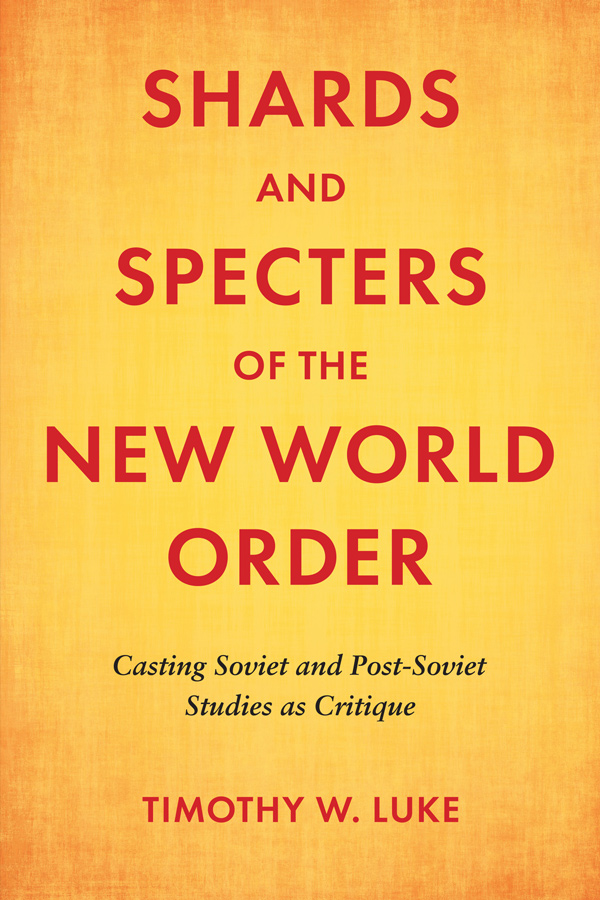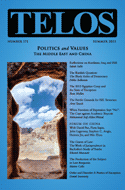By Telos Press · Friday, December 22, 2023 Now available: Shards and Specters of the New World Order, by Timothy W. Luke. Order the paperback edition today in our online store and save 20% by using the coupon code BOOKS20. Also available in Kindle ebook format at Amazon.com.
Shards and Specters of the New World Order: Casting Soviet and Post-Soviet Studies as Critique
by Timothy W. Luke
 From ideological dynamics in revolutionary Russia, cultural stagnation in the USSR, and ineffective Soviet governance in the 1980s to the USSR’s institutional collapse in 1991, the emergence of the Russian Federation under Boris Yeltsin, and Vladimir Putin’s wars in Ukraine since 2014, Timothy W. Luke’s Shards and Specters of the New World Order investigates how the geopolitical clout of the United States has worked to contain, but at other times sustain, the Soviet Union and later the Russian Federation. Luke’s critical studies also examine how Moscow’s strategies provoked radical Islamic resistance movements in Afghanistan and aided anti-Western client states, like Iraq and Syria, that threatened the New World Order envisioned in Washington after 1991. From ideological dynamics in revolutionary Russia, cultural stagnation in the USSR, and ineffective Soviet governance in the 1980s to the USSR’s institutional collapse in 1991, the emergence of the Russian Federation under Boris Yeltsin, and Vladimir Putin’s wars in Ukraine since 2014, Timothy W. Luke’s Shards and Specters of the New World Order investigates how the geopolitical clout of the United States has worked to contain, but at other times sustain, the Soviet Union and later the Russian Federation. Luke’s critical studies also examine how Moscow’s strategies provoked radical Islamic resistance movements in Afghanistan and aided anti-Western client states, like Iraq and Syria, that threatened the New World Order envisioned in Washington after 1991.
Continue reading →
By Telos Press · Monday, April 3, 2023 In today’s episode of the Telos Press Podcast, David Pan talks with Miles Yu about his article “Escape from Civilization’s Predicaments,” from Telos 201 (Winter 2022). An excerpt of the article appears here. In their conversation they discuss the main problems with using the idea of civilization as a way of understanding today’s geopolitical conflicts; the meaning of ideology and its effect on politics; why it is more important to think of ideology than of civilization as a way of understanding politics; how the inability of Americans to see the importance of ideology in the world has affected U.S. foreign policy; what kind of foreign policy would emerge out of the focus on ideology; why Marxism as an ideology has maintained its appeal both for countries such as China and for U.S. intellectuals; and what strategies the United States has in this ideological conflict. If your university has an online subscription to Telos, you can read the full article at the Telos Online website. For non-subscribers, learn how your university can begin a subscription to Telos at our library recommendation page. Print copies of Telos 201 are available for purchase in our online store.
Continue reading →
By Telos Press · Friday, October 7, 2016 “The human is a land-being, a land-dweller. He stands and walks and moves upon the firmly grounded earth. This is his standpoint and his soil; through it he receives his viewpoint; this defines his impressions and his way of seeing the world. He receives not only his field of vision but also the form of his gait and his movements, his shape as a living being born and moving upon the earth.”
—Carl Schmitt, Land and Sea: A World-Historical Meditation
Continue reading →
By Telos Press · Thursday, August 25, 2016 “The human is a land-being, a land-dweller. He stands and walks and moves upon the firmly grounded earth. This is his standpoint and his soil; through it he receives his viewpoint; this defines his impressions and his way of seeing the world. He receives not only his field of vision but also the form of his gait and his movements, his shape as a living being born and moving upon the earth.”
—Carl Schmitt, Land and Sea: A World-Historical Meditation
Continue reading →
By David Pan · Sunday, June 26, 2016 Walk around Berlin these days and you will find that you will hear almost as much English being spoken on the streets as German. While some describe this situation as a sign that Berlin has now become a cosmopolitan city, this very interpretation reveals precisely the attitude that has led to the rise of English in Germany. To speak English is to be cosmopolitan, and to speak German is to be provincial, and so it becomes a mark of pride to converse in English rather than one’s native German, at least for a certain segment of the population. And therein lies the problem. For it is precisely that segment of global business people, academics, and bureaucrats against whom nationalist sentiment has been rising all over Europe amongst the monolinguals who see themselves as excluded from the European project.
Continue reading →
By Sabah Salih · Wednesday, July 15, 2015
 The recent dramatic rise of Kurdistan as a major power player in the Middle East could not have happened without America’s 2003 regime change in Iraq. The change also resulted in a dramatic rise in the standard of living and in the way people live their lives and think about themselves and their world. Contrary to the common view in the West, the intervention did not break up a unified Iraq; it rather sped up the unraveling of colonialism’s post–World War I handiwork, which stupidly imposed the tyranny of a minority on the majority. Saddam Hussein laid the groundwork for ISIS’s emergence with his creation of Saddam’s Fidayeen paramilitary force following the first Gulf War. The recent dramatic rise of Kurdistan as a major power player in the Middle East could not have happened without America’s 2003 regime change in Iraq. The change also resulted in a dramatic rise in the standard of living and in the way people live their lives and think about themselves and their world. Contrary to the common view in the West, the intervention did not break up a unified Iraq; it rather sped up the unraveling of colonialism’s post–World War I handiwork, which stupidly imposed the tyranny of a minority on the majority. Saddam Hussein laid the groundwork for ISIS’s emergence with his creation of Saddam’s Fidayeen paramilitary force following the first Gulf War.
Continue reading →
|
|
 From ideological dynamics in revolutionary Russia, cultural stagnation in the USSR, and ineffective Soviet governance in the 1980s to the USSR’s institutional collapse in 1991, the emergence of the Russian Federation under Boris Yeltsin, and Vladimir Putin’s wars in Ukraine since 2014, Timothy W. Luke’s Shards and Specters of the New World Order investigates how the geopolitical clout of the United States has worked to contain, but at other times sustain, the Soviet Union and later the Russian Federation. Luke’s critical studies also examine how Moscow’s strategies provoked radical Islamic resistance movements in Afghanistan and aided anti-Western client states, like Iraq and Syria, that threatened the New World Order envisioned in Washington after 1991.
From ideological dynamics in revolutionary Russia, cultural stagnation in the USSR, and ineffective Soviet governance in the 1980s to the USSR’s institutional collapse in 1991, the emergence of the Russian Federation under Boris Yeltsin, and Vladimir Putin’s wars in Ukraine since 2014, Timothy W. Luke’s Shards and Specters of the New World Order investigates how the geopolitical clout of the United States has worked to contain, but at other times sustain, the Soviet Union and later the Russian Federation. Luke’s critical studies also examine how Moscow’s strategies provoked radical Islamic resistance movements in Afghanistan and aided anti-Western client states, like Iraq and Syria, that threatened the New World Order envisioned in Washington after 1991.  The recent dramatic rise of Kurdistan as a major power player in the Middle East could not have happened without America’s 2003 regime change in Iraq. The change also resulted in a dramatic rise in the standard of living and in the way people live their lives and think about themselves and their world. Contrary to the common view in the West, the intervention did not break up a unified Iraq; it rather sped up the unraveling of colonialism’s post–World War I handiwork, which stupidly imposed the tyranny of a minority on the majority. Saddam Hussein laid the groundwork for ISIS’s emergence with his creation of Saddam’s Fidayeen paramilitary force following the first Gulf War.
The recent dramatic rise of Kurdistan as a major power player in the Middle East could not have happened without America’s 2003 regime change in Iraq. The change also resulted in a dramatic rise in the standard of living and in the way people live their lives and think about themselves and their world. Contrary to the common view in the West, the intervention did not break up a unified Iraq; it rather sped up the unraveling of colonialism’s post–World War I handiwork, which stupidly imposed the tyranny of a minority on the majority. Saddam Hussein laid the groundwork for ISIS’s emergence with his creation of Saddam’s Fidayeen paramilitary force following the first Gulf War. 

